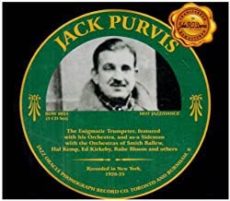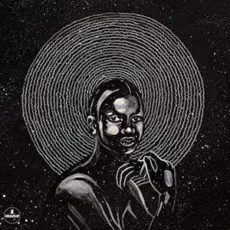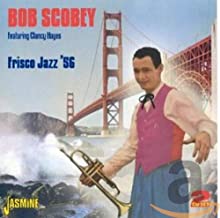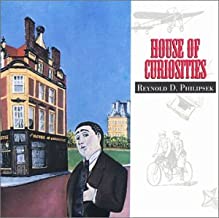
Daily Dose Of Jazz…
John “Jack” Purvis was born in Kokomo, Indiana on December 11, 1906 and became uncontrollable after his mother’s death in 1912. This resulted in being sent to a reform school, but while there, he discovered that he had an uncanny musical ability, and soon became proficient enough to play both the trombone and trumpet professionally. Leaving the reformatory he continued his high school education, while playing paying gigs on the side. One of the earliest jobs he had as a musician was with a band led by the Royal Canadian Mounted Police. Not long afterward, he worked with the dance band of Hal Denman.
After high school he worked in Indiana for a time then went to Lexington, Kentucky where he played with the Original Kentucky NightHawks. Around this time he learned to fly planes. In 1926 he was with Bud Rice and toured New England. The remainder of 1926 and the beginning of 1927 was with Whitey Kaufman’s Original Pennsylvanians. For a short time he played trumpet with Arnold Johnson’s orchestra, and by July 1928 he traveled to France with George Carhart’s band. A brush with the law forced him to return to New York City in 1928.
From 1929 on he joined Hal Kemp’s band and recorded with Kemp, Smith Ballew, Ted Wallace, Rube Bloom, the California Ramblers, and Roy Wilson’s Georgia Crackers. He led a couple of racially mixed recording sessions including the likes of J.C. Higginbotham, and Adrian Rollini. He worked with the Dorsey Brothers, Fletcher Henderson, Fred Waring, Charlie Barnet. the New Orleans Symphony Orchestra.
Moving to Los Angeles, California he found success with radio broadcasting, worked with the George Stoll Orchestra as a writer, and arranged for Warner Bros. Studios. He composed Legends of Haiti for a one hundred and ten piece orchestra.
Arrested in Texas in 1937, he spent a total of nine years in prison for robbery and breaking parole. After his final release he worked at non-musical careers which included working as a chef, aviator, carpenter, radio repairman and a mercenary. One of the earliest trumpeters to incorporate the innovations pioneered by Louis Armstrong in the late 1920s.
His mental stability was always in question, having attempted suicide on several occasions. Trumpeter Jack Purvis, who played trombone, harp, andcomposed Dismal Dan and Down Georgia Way, passed away on March 30, 1962.
More Posts: arranger,harp,history,instrumental,jazz,music,trombone,trumpet

Daily Dose Of Jazz…
Irving Fazola was born in New Orleans, Louisiana on December 10, 1912 and receiving the nickname “Fazola”, he used it as his last name. Influenced early by Leon Roppolo, he was playing professionally by age 15. He worked with Sharkey Bonano, Candy Candido, Armand Hug, and Louis Prima. He joined the Ben Pollack band when it came throughNew Orleans and performed with it in Chicago, Illinois and New York City.
After brief time with Glenn Miller and Gus Arnheim, Fazola became a member of the Bob Crosby band in 1938. He achieved some fame with this band, ranking as top clarinetist in the DownBeat magazine polls of 1940 and 1941. After leaving Crosby, he worked in bands in Chicago, New York, and New Orleans, including time with George Brunies at the Famous Door, before settling in New Orleans in 1943.
A heavy drinker, which contributed to his weight and failing health, clarinetist Irving Fazola, who influenced Pete Fountain, passed away of a heart attack at 36 on March 20, 1949.
More Posts: clarinet,history,instrumental,jazz,music

The Quarantined Jazz Voyager
We Are Sent Here By History is an acclaimed studio album by Shabaka Hutchings, a British-Barbadian musician, under his band Shabaka and the Ancestors, composed of South African musicians. It was released on March 13, 2020 on Impulse! Records.
We Are Sent Here by History has charted in Germany, Scotland, U.S. and UK and reached number 3 on the latter. The album was recorded at Milestone Studio and Sumo Sounds Studio in Johannesburg, mixed at The Crush in London, produced by Shabaka Hutchings and Dilip Harris, the creative director was Josh Cheuse, and the illustration was by Daniela Yohannes.
Track Listing | 63:58 All songs were composed by Shabaka Hutchings with lyrics by Siyabonga Mthembu- They Who Must Die ~ 10:10
- You’ve Been Called ~ 6:29
- Go My Heart, Go To Heaven ~ 6:41
- Behold, The Deceiver ~ 6:01
- Run, The Darkness Will Pass
- The Coming Of The Strange Ones ~ 6:28
- Beast Too Spoke Of Suffering ~ 2:58
- We Will Work (On Redefining Manhood) ~ 5:24
- ‘Til The Freedom Comes Home ~ 7:06
- Finally, The Man Cried ~ 5:48
- Teach Me How To Be Vulnerable ~ 2:45
- Tenor Saxophone, Clarinet ~ Shabaka Hutchings
- Alto Saxophone ~ Mthunzi Mvubu
- Double Bass ~ Ariel Zamonsky
- Drums – Tumi Mogorosi
- Electric Piano, Fender Rhodes ~ Nduduzo Makhathini (track: 2, 4)
- Percussion ~ Gontse Makhene
- Piano ~ Thandi Ntuli (track: 2, 11)
- Trumpet ~ Mandla Mlangeni (track: 7)
- Voice ~ Siyabonga Mthembu
More Posts: adventure,album,club,genius,jazz,museum,music,preserving,restaurant,saxophone,travel

Daily Dose Of Jazz…
Robert Alexander Scobey Jr. was born on December 9, 1916 in Tucumcari, New Mexico and began his career playing in dance orchestras and nightclubs in the 1930s. By 1938 he was working as second trumpeter for Lu Watters in the Yerba Buena Jazz Band. By 1949, he was leading his own band under the name Bob Scobey’s Frisco Band.
In the Fifties the group continued to play a three-year residency at the Victor & Roxie’s, growing their popularity. Clancy Hayes joined the band to sing, play banjo and contributed his own compositions such as Huggin’ and a Chalkin’. The collaboration recorded over two hundred tracks until he left in 1959 to follow a solo career.
The Frisco Band broadcasted in 1952 and 1953 on Rusty Draper’s television show. In 1953, Louis Armstrong sang with them at the Pasadena Civic Auditorium. From 1954-57, blues singer Lizzie Miles recorded and toured with the band.
In 1955, Scobey and his band played dates at San Quentin Prison and at the Rancho Grande in Lafayette, California. Two years later he recorded for Verve Records and RCA Victor, and on the latter Bing with a Beat recorded with Bing Crosby in 1957. From early in 1956, he toured colleges and universities and, in 1958, he recorded many of the student favorites and released the album College Classics.
While touring in 1960, he was reportedly drinking half and half or heavy cream to ease the pain in his stomach. Trumpeter Bob Scobey passed away from cancer on June 12, 1963 in Montreal, Quebec, Canada. His wife Jan posthumously produced a biography titled He Rambled!.
More Posts: bandleader,history,instrumental,jazz,music,trumpet

Daily Dose Of Jazz…
Reynold David Philipsek was born December 8, 1952 in Richmond, Minnesota and at the age nine began playing guitar and by 14 joined the American Federation of Musicians labor union. At sixteen, he wrote and recorded the single Oval Portrait with the band Cure of Ares. At 18, he was exposed, through a radio broadcast, to gypsy jazz through Django Reinhardt.
In 1975, he took a lesson and two workshops from jazz guitarist Joe Pass, studied jazz guitar and The Complete Johnny Smith Approach to Guitar with Mike Elliott.. Post Cure of Ares, he played in bands in the midwest and in 1989, Philipsek became primarily a solo act recording albums in pop, rock, jazz, and gypsy jazz on his label, Rephi Records.
He began to concentrate on gypsy jazz with All the Things You Are and Tales from the North Woods, that includes elements of gypsy jazz, bebop, Latin folk, modal jazz, and Slavic folk music informed by his burgeoning interest in his Czech and Polish heritage. Along with appearing at gypsy jazz festivals, jazz clubs, and concert venues, he composed the score for the children’s short film. St. Cloud Sleep, wrote a book of poetry Journey to the Middle Ages, and released Three Piece Suite/Munsinger Gardens on DVD.
He went on to produce Live at The Times recorded with the Twin Cities Hot Club and the documentary A Life Well Played in 2016. Guitarist, singer, songwriter, and poet Reynold Philipsek continues to explore his music.
More Posts: bandleader,guitar,history,instrumental,jazz,music,vocal


